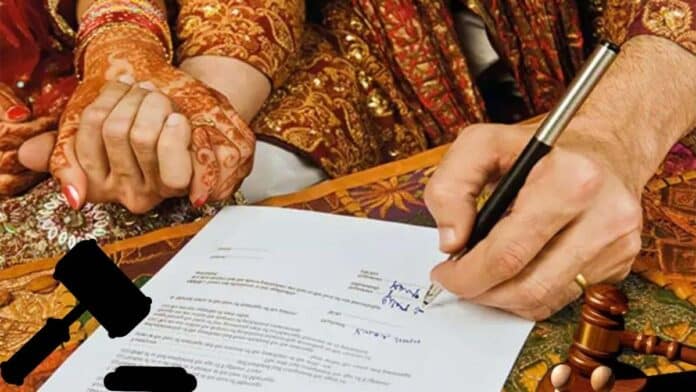INDIA is a country, where the people traditionally followed the culture of arranged marriages, a practice which is followed by every Indian community irrespective of religion, caste and class. In the older days two families would decide on the match and usually couples were married as per their choices. INDIA has 28 states and 9 union territories and every state has different types of marriage ceremony.
TYPE OF MARRIAGE REGISTRATIONS:
Hindu Marriage Act, 1955:
Follow by vedic rituals and the three main rituals i.e. Kanyadaan (means the father of the bride giving her away), Panigrahana (means joining hands of the bride and the groom in front of the fire) and Saptapadi (means making seven rounds around the fire) are followed. But some communities are following different rituals. All marriages between two people of following religion i.e. Hindus, Buddhists, Jainas or Sikhs are registered under the Hindu Marriage Act, 1955 or the Special Marriage Act, 1954.
Special Marriage Act, 1954:
All type of inter-caste and inter-faith marriages are conducted under the Special Marriage Act. Under this provision the parties can be of Indian national or foreign national. The court marriage rules include other conditions such as the parties should not be in an existing marriage with other persons and that they should be of sound mind.
Muslim Personal (Shariat) Law Act, 1937:
The wedding ceremony called the Nikah, which performed by the maulvi, a type of priest, who follow islamic traditions.
Indian Christian Marriage Act, 1872: Performed by minister or a priest of a church.
Parsi Marriage and Divorce Act, 1936: Follow by exchange of silver coins between the families of the bride and groom.
No matter in which state, the marriage is taking place or what rituals are followed, the marriage has to be registered according to the Law of Land.
COURT MARRIAGE:
The procedure of court marriages in India is governed by Special Marriage Act of 1954. In this provision the marriage, take place in court in front of a marriage officer without following the traditions of customary marriage between a male and a female, who are eligible to marry without any bar to their caste, religion, or creed in the presence of three witnesses.
CONDITIONS OF COURT MARRIAGE:
Age: The parties must be eligible to marry. The Court Marriage age for a boy is 21 years and for a girl is 18 years.
No Pre-existing marriage: There should be no pre-existing marriage for either party or divorce has been obtained from the previous spouse.
Medical conditions: Both parties should not suffer from any of mental disorder/ unsound mind.
Valid Consent: The parties must have given free consent for Court Marriage.
Prohibited degrees of relationships: The parties to the marriage should not be related to each other under the prohibited degrees of marriage Unless it’s valid in the customs or traditions of the religion of any of the two parties.
DOCUMENTS REQUIRED FOR THE COURT MARRIAGE
1) Application form duly signed by both the parties.
2) Date of birth proof of both the parties.
3) Residential address proof of both the parties.
4) Receipt of fees paid along with the application form.
5) 2 passport size photographs of both the parties.
6) Copy of divorce decree or order in the case of a divorcee and death certificate of spouse in case of a widow or widower.
7) Affidavit from both the parties.
COURT MARRIAGE PROCEDURE
Step 1: File a specified form of ‘Notice of Intended Marriage’ to the District Marriage Registrar in which at least one of the parties to the marriage has resided for a period of not less than 30 days immediately preceding the date on which such notice is given.
Step 2: Publication of Notice by the Registrar of Marriage inviting objections, if any.
Step 3: After the expiration of 30 days from the date on which notice of intended marriage has been published, the marriage may be solemnized unless it has been objected by any person.
Step 4: The marriage may be solemnised at the specified marriage office.
Written By
Adv Prem Joshi
Founder, Joshi Law Associates (JLA)
Practicing in Delhi High Court & District Courts




